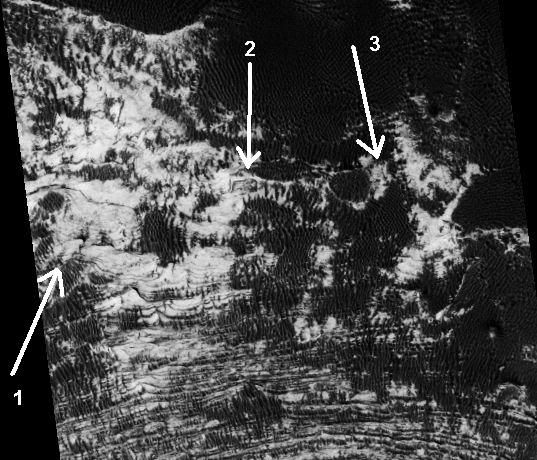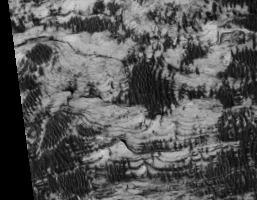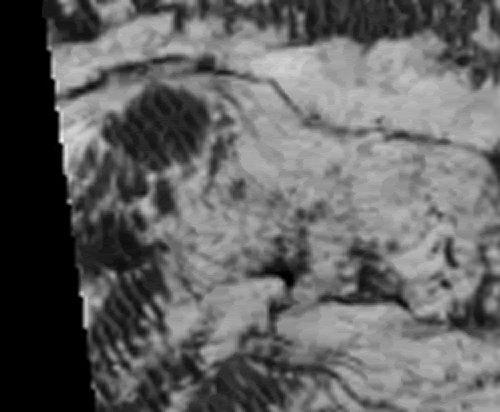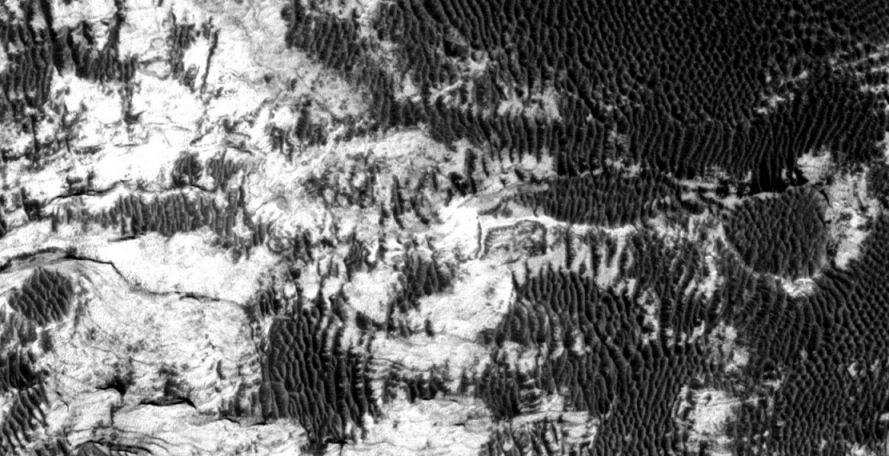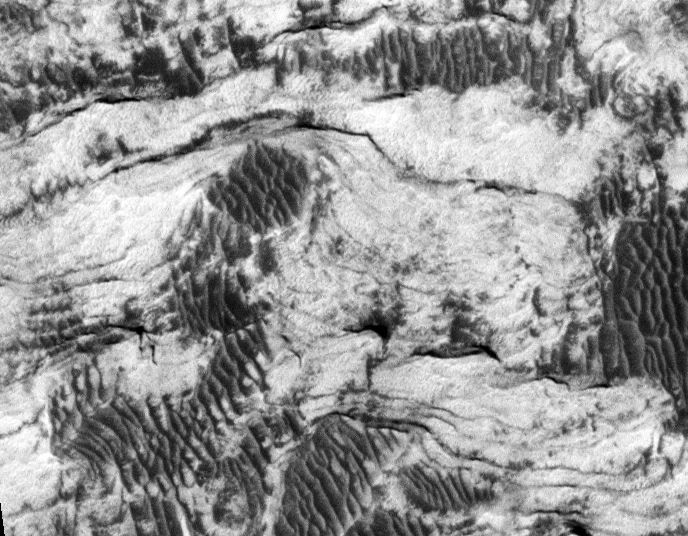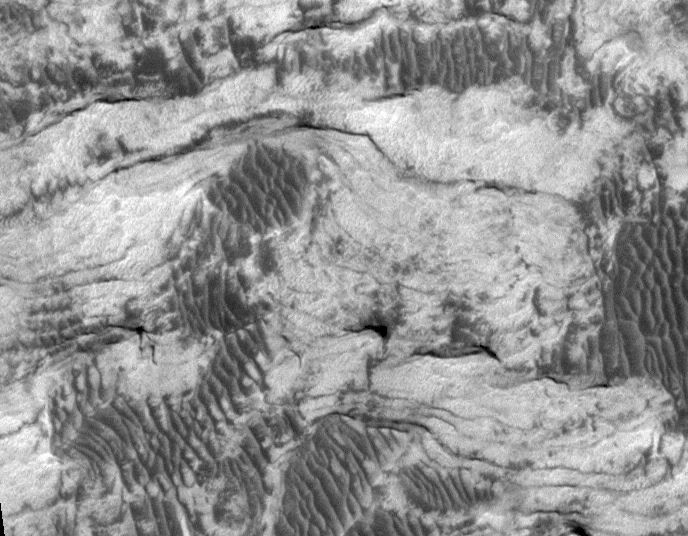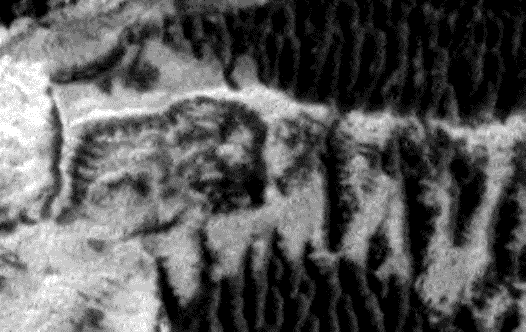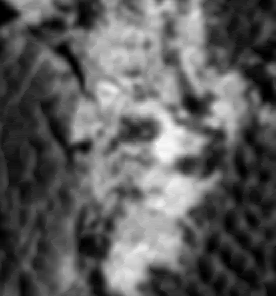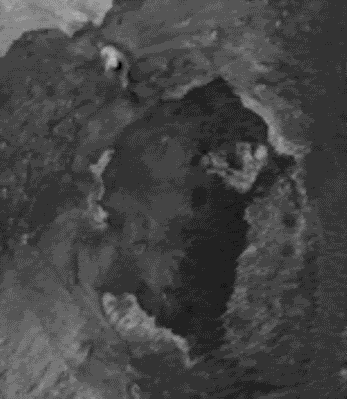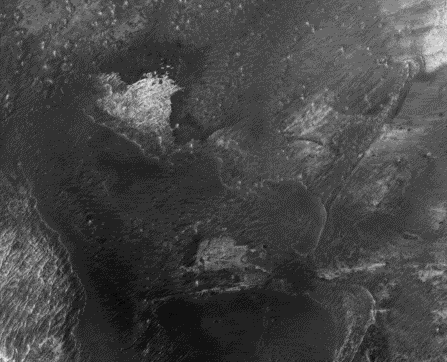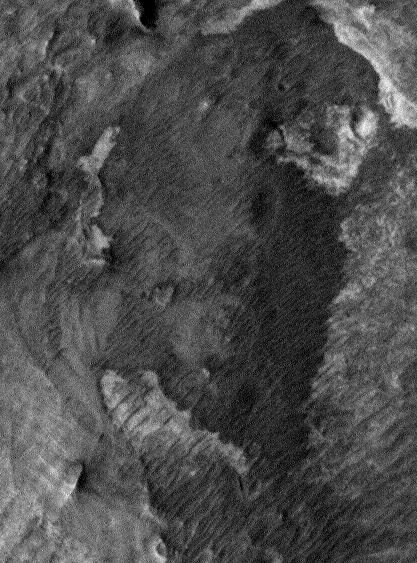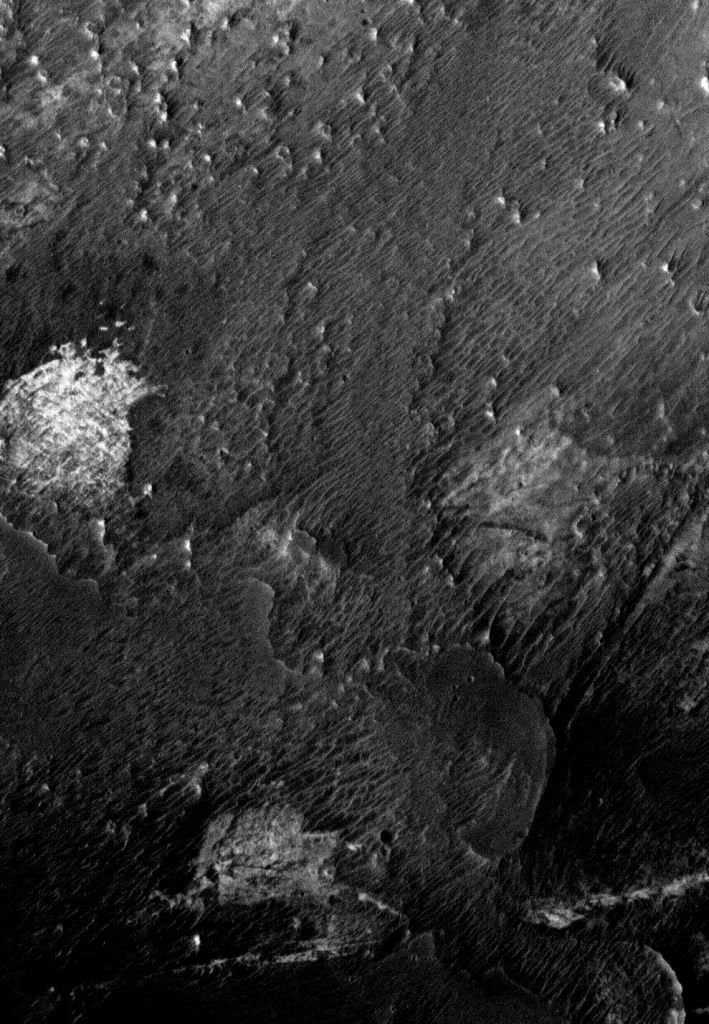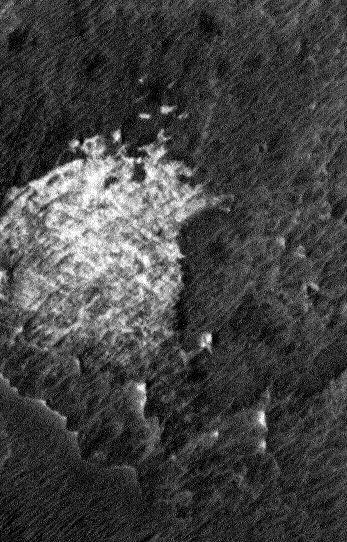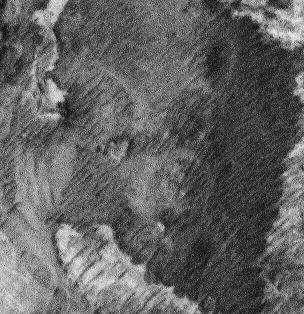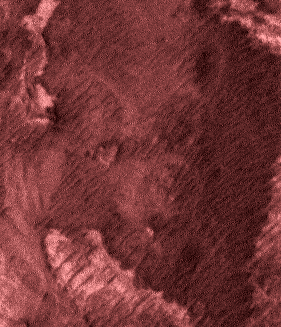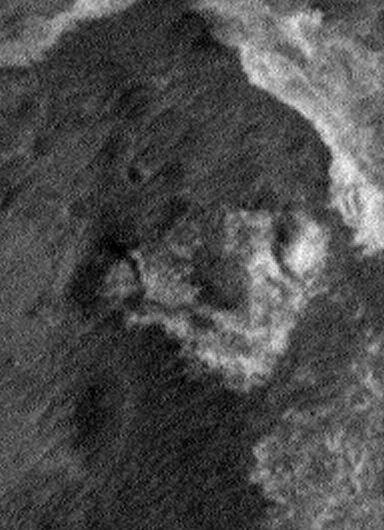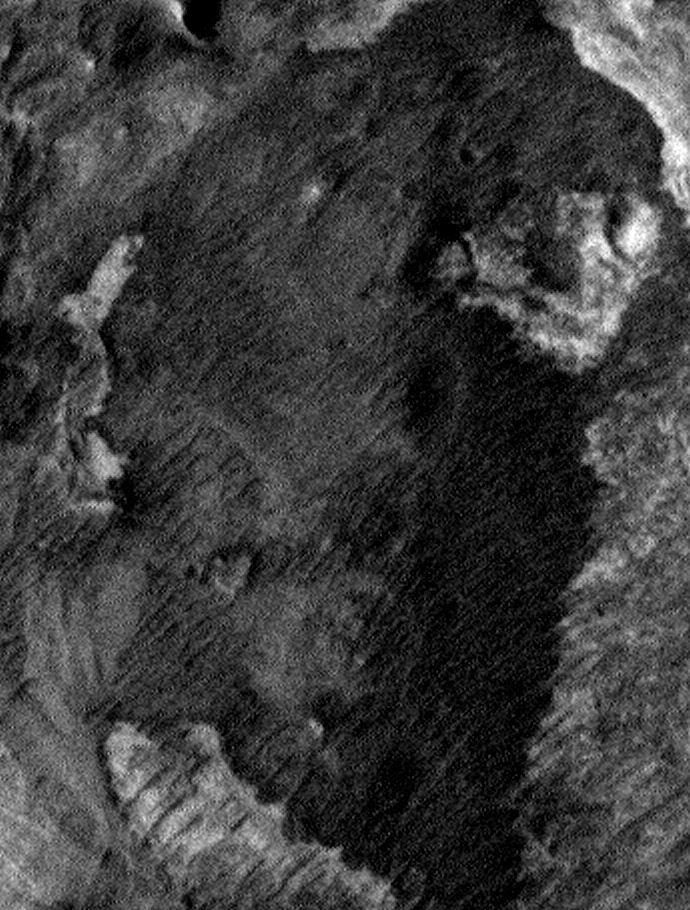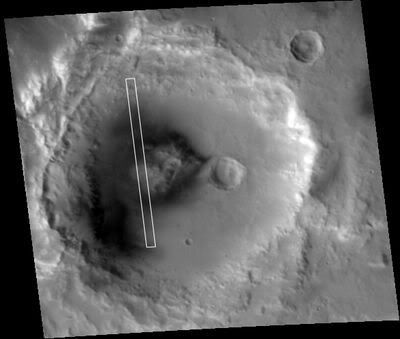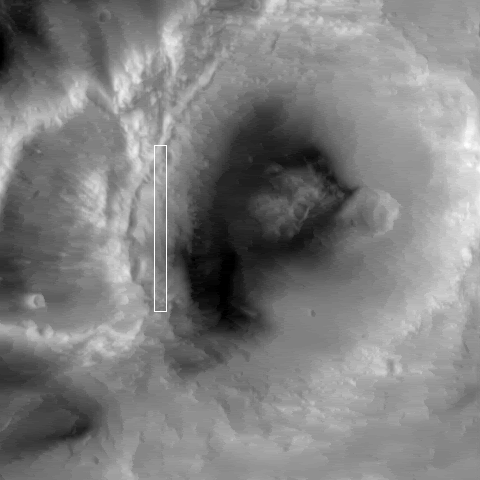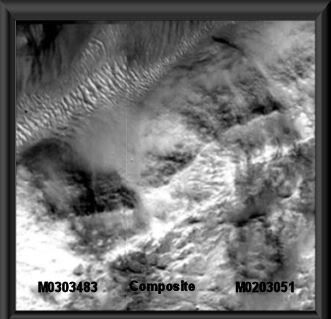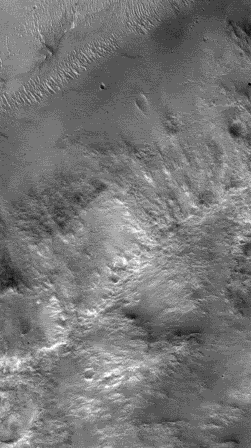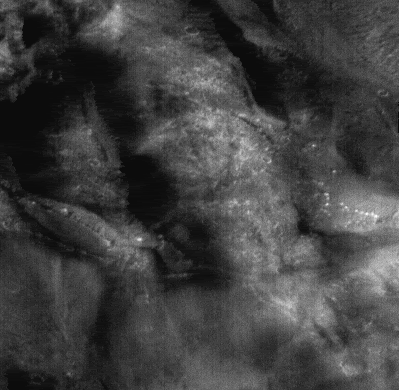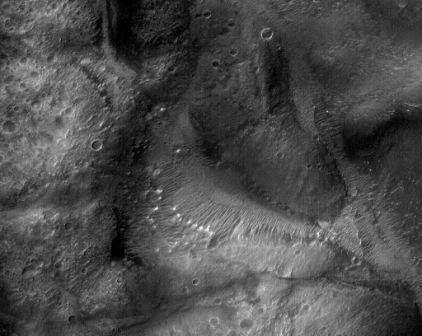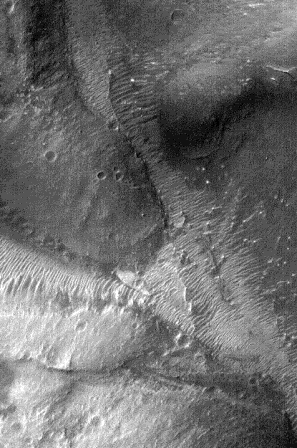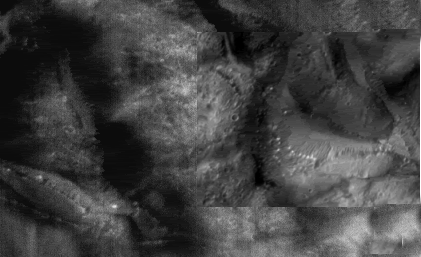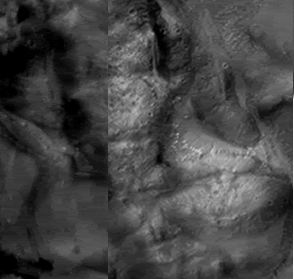- Thank you received: 0
Faces from the Chasmas
- neilderosa
-
- Offline
- Platinum Member
-

Less
More
18 years 2 months ago #9208
by neilderosa
Replied by neilderosa on topic Reply from Neil DeRosa
Here's a little scene mentioned before, that was captured in three MOC images:
www.msss.com/moc_gallery/m07_m12/images/M10/M1002361.html
www.msss.com/moc_gallery/r22_s04/images/R22/R2200700.html
www.msss.com/moc_gallery/s05_s10/images/S10/S1000829.html
M10 has a resolution of 5.71 meters, and S10 is 1.51 meters. The following study is a comparison of the two images.
First is M1002361, "Pareidilic Faces" (P faces). An arrow indicates the three objects we will look at; they are numbered 1 (archie), 2 (kilroy), and 3 (pretty dogface). (res. 5.71)
Number 1 is a possible P face in that the details are vague, if you stand back a little the "archie" character gets swallowed up by a larger animal face.
Number 1 enlarged. Note he becomes vague as enlarged in true pareidilic style.
Now we move on to the objects as seen in S1000829, which at 1.5 meters/pixel is 4 times better resolution. So far the three objects look about the same albeit a little sharper.
Now here's archie in hi-res and zoomed in. Note that you can see the details of his construction; the dark striated structures are his hair and shading, a cave opening in the surface is his mouth, the eye is still defined but lighter, and the nose and face outline becomes fainter but remains, appearing more like the Piccard figure in the "Family" image. The larger animal face is now lost in the details.
a) darker
b) lighter
Here's kilroy and the pretty dogface in hi-res.
Here's kilroy again. Note the triangle in front of his eye, the sewn stitching look for his hair, and dare I say it, the little faces inside of <i>his</i> face.
And here's the pretty dogface. Even smaller, maybe 70 meters wide, but still well defined. Note her girlish eyelashes, pointed ears, and dark muzzle.
Later I'll comment on what this all may mean--if anything.
One preliminary thought. An idea was once bandied about by my brother and others that different faces were meant to be seen at different distances and/or scales. There seems to be some evidence of that here.
(cont.) I forgot to give Trinket credit here. As far as I know he was the first to note the concept of faces at multiple scales. Also, it seems that all three of these faces are very obvious and easily seen, but as rich pointed out from his experiment, individuals vary in their ability to see them, so if anybody needs to see keys for these faces please let me know. They are easy to make.
Neil
www.msss.com/moc_gallery/m07_m12/images/M10/M1002361.html
www.msss.com/moc_gallery/r22_s04/images/R22/R2200700.html
www.msss.com/moc_gallery/s05_s10/images/S10/S1000829.html
M10 has a resolution of 5.71 meters, and S10 is 1.51 meters. The following study is a comparison of the two images.
First is M1002361, "Pareidilic Faces" (P faces). An arrow indicates the three objects we will look at; they are numbered 1 (archie), 2 (kilroy), and 3 (pretty dogface). (res. 5.71)
Number 1 is a possible P face in that the details are vague, if you stand back a little the "archie" character gets swallowed up by a larger animal face.
Number 1 enlarged. Note he becomes vague as enlarged in true pareidilic style.
Now we move on to the objects as seen in S1000829, which at 1.5 meters/pixel is 4 times better resolution. So far the three objects look about the same albeit a little sharper.
Now here's archie in hi-res and zoomed in. Note that you can see the details of his construction; the dark striated structures are his hair and shading, a cave opening in the surface is his mouth, the eye is still defined but lighter, and the nose and face outline becomes fainter but remains, appearing more like the Piccard figure in the "Family" image. The larger animal face is now lost in the details.
a) darker
b) lighter
Here's kilroy and the pretty dogface in hi-res.
Here's kilroy again. Note the triangle in front of his eye, the sewn stitching look for his hair, and dare I say it, the little faces inside of <i>his</i> face.
And here's the pretty dogface. Even smaller, maybe 70 meters wide, but still well defined. Note her girlish eyelashes, pointed ears, and dark muzzle.
Later I'll comment on what this all may mean--if anything.
One preliminary thought. An idea was once bandied about by my brother and others that different faces were meant to be seen at different distances and/or scales. There seems to be some evidence of that here.
(cont.) I forgot to give Trinket credit here. As far as I know he was the first to note the concept of faces at multiple scales. Also, it seems that all three of these faces are very obvious and easily seen, but as rich pointed out from his experiment, individuals vary in their ability to see them, so if anybody needs to see keys for these faces please let me know. They are easy to make.
Neil
Please Log in or Create an account to join the conversation.
- neilderosa
-
- Offline
- Platinum Member
-

Less
More
- Thank you received: 0
18 years 2 months ago #16231
by neilderosa
Replied by neilderosa on topic Reply from Neil DeRosa
Continuing my efforts in compiling data and evidence in support of the artificiality hypothesis, I return to another group of features presented previously for which I have found a confirming image at higher resolution. Sources:
www.msss.com/moc_gallery/m13_m18/images/M17/M1700467.html
www.msss.com/moc_gallery/s05_s10/images/S05/S0500110.html
First, I resubmit two croppings from M1700467 (resolution, 5.72 meters); Cavebear:
…and Flintstones. These are only mildly impressive especially if the viewer is not "locked" into them. Still, they reminded me of the Cro Magnon cave paintings, hence the nomenclature.
Here are the same images from high resolution S0500110 (1.51 meters/pixel). Again, at a distance (zoom-out) they are not much different from the previous, although somewhat sharper. Significant however is the fact that they are confirmed, rather than lost, as pareidolia theory predicts, and new details are revealed at higher magnification supporting artificiality, also falsifying pareidolia. My subjective impression is that the cavebear is one of the more realistic Mars-glyphs we have, especially his left eye (our view). I hesitate to use the term "flat-art" beacuse many of these artifacts are actually raised-reliefs; as the cavebear may be.
Here's a zoom-in of "Fred Flintstone."
A close-up of the cavebear.
Cavebear in tint.
Object in upper right of cavebear, now revealed as another face.
And for emphasis.
Note: all items have been compressed for posting.
Neil
www.msss.com/moc_gallery/m13_m18/images/M17/M1700467.html
www.msss.com/moc_gallery/s05_s10/images/S05/S0500110.html
First, I resubmit two croppings from M1700467 (resolution, 5.72 meters); Cavebear:
…and Flintstones. These are only mildly impressive especially if the viewer is not "locked" into them. Still, they reminded me of the Cro Magnon cave paintings, hence the nomenclature.
Here are the same images from high resolution S0500110 (1.51 meters/pixel). Again, at a distance (zoom-out) they are not much different from the previous, although somewhat sharper. Significant however is the fact that they are confirmed, rather than lost, as pareidolia theory predicts, and new details are revealed at higher magnification supporting artificiality, also falsifying pareidolia. My subjective impression is that the cavebear is one of the more realistic Mars-glyphs we have, especially his left eye (our view). I hesitate to use the term "flat-art" beacuse many of these artifacts are actually raised-reliefs; as the cavebear may be.
Here's a zoom-in of "Fred Flintstone."
A close-up of the cavebear.
Cavebear in tint.
Object in upper right of cavebear, now revealed as another face.
And for emphasis.
Note: all items have been compressed for posting.
Neil
Please Log in or Create an account to join the conversation.
- neilderosa
-
- Offline
- Platinum Member
-

Less
More
- Thank you received: 0
18 years 2 months ago #10811
by neilderosa
Replied by neilderosa on topic Reply from Neil DeRosa
Here's one I'm not taking too seriously, but it is interesting. It appears as two large scale faces in semi-profile in the center of the Sharonov crater at around 57°W, 27°N, again in the vicinity of the dichotomy border. It's too big for a narrow angle swath. So in order to falsify it, you would probably need 4-5 swaths of 3 km wide side by side to encompass it. In the meantime, we have it fairly clearly in at least 2 context images.
S0400603, faces in crater.
S1700992, faces in crater.
Neil
S0400603, faces in crater.
S1700992, faces in crater.
Neil
Please Log in or Create an account to join the conversation.
- neilderosa
-
- Offline
- Platinum Member
-

Less
More
- Thank you received: 0
18 years 2 months ago #16115
by neilderosa
Replied by neilderosa on topic Reply from Neil DeRosa
Here's M0203051 and M0303483 composite of "Barbara," posted previously.
Below is a hi-res (1.5) m/p third confirmation of this possible Mars-glyph. For those who are not aware of it, this is the highest resolution (more or less) possible for the MGS/MOC.
Here is S1402499 confirmation of Barbara. Note that you can only see part of the face because the 2km face is too large to fit inside of the 1.5 km wide hi-res swath. Note also that the first two images of Barbara (and crownface) were imaged from directly overhead. S14 has a somewhat oblique viewing angle, hence accounting for the foreshortening of the features. But the details are still evident. Possibly only Trinket and I can also see other smaller faces inside of the larger scale Barbara (aside from Crownface which is outside the perimeter of this swath.) To look for small faces, however, the viewer will have to download the original gif as this compressed version will not contain sufficient information.
S1402499, source:
www.msss.com/mars_images/moc/publicresul...06/01/S14-02499p.gif
Neil
Below is a hi-res (1.5) m/p third confirmation of this possible Mars-glyph. For those who are not aware of it, this is the highest resolution (more or less) possible for the MGS/MOC.
Here is S1402499 confirmation of Barbara. Note that you can only see part of the face because the 2km face is too large to fit inside of the 1.5 km wide hi-res swath. Note also that the first two images of Barbara (and crownface) were imaged from directly overhead. S14 has a somewhat oblique viewing angle, hence accounting for the foreshortening of the features. But the details are still evident. Possibly only Trinket and I can also see other smaller faces inside of the larger scale Barbara (aside from Crownface which is outside the perimeter of this swath.) To look for small faces, however, the viewer will have to download the original gif as this compressed version will not contain sufficient information.
S1402499, source:
www.msss.com/mars_images/moc/publicresul...06/01/S14-02499p.gif
Neil
Please Log in or Create an account to join the conversation.
18 years 2 months ago #17370
by rderosa
Replied by rderosa on topic Reply from Richard DeRosa
<blockquote id="quote"><font size="2" face="Verdana, Arial, Helvetica" id="quote">quote:<hr height="1" noshade id="quote"><i>Originally posted by neilderosa</i>
<br />Significant however is the fact that they are confirmed, rather than lost, as pareidolia theory predicts, and new details are revealed at higher magnification supporting artificiality, also falsifying pareidolia. <hr height="1" noshade id="quote"></blockquote id="quote"></font id="quote">I've heard this argument before, but this not what I'm seeing. There are many possible combinations.
For instance, you can start with known pareidolia, magnify it, and it's still pareidolia. The same basic pareidolic image might be there at varying magnifications. In another case, we might think it's pareidolia, magnify it, and find it's something real. Or, we think it's real, magnify it, and it's still real, or magnify it, and see it's really pareidolia.
It just simply isn't true to say that just because something is magnified, and still there, or even if we think we see more details, that proves it's real, and falsifies pareidolia.
Here are two examples, using Earthly Pareidolia. Imagine we're Martians, and we take these pictures. First we find what we think might be an archaelogical find.
Our first try, we get this:
Suppose we try to magnify it, but get empty magnification right away. So, six months later, we get another image that's 10 fold greater in magnification:
What does that tell us about whether or not it's pareidolia?
Here's another example, this time with a 3 fold difference.
Before:
After:
rd
<br />Significant however is the fact that they are confirmed, rather than lost, as pareidolia theory predicts, and new details are revealed at higher magnification supporting artificiality, also falsifying pareidolia. <hr height="1" noshade id="quote"></blockquote id="quote"></font id="quote">I've heard this argument before, but this not what I'm seeing. There are many possible combinations.
For instance, you can start with known pareidolia, magnify it, and it's still pareidolia. The same basic pareidolic image might be there at varying magnifications. In another case, we might think it's pareidolia, magnify it, and find it's something real. Or, we think it's real, magnify it, and it's still real, or magnify it, and see it's really pareidolia.
It just simply isn't true to say that just because something is magnified, and still there, or even if we think we see more details, that proves it's real, and falsifies pareidolia.
Here are two examples, using Earthly Pareidolia. Imagine we're Martians, and we take these pictures. First we find what we think might be an archaelogical find.
Our first try, we get this:
Suppose we try to magnify it, but get empty magnification right away. So, six months later, we get another image that's 10 fold greater in magnification:
What does that tell us about whether or not it's pareidolia?
Here's another example, this time with a 3 fold difference.
Before:
After:
rd
Please Log in or Create an account to join the conversation.
- neilderosa
-
- Offline
- Platinum Member
-

Less
More
- Thank you received: 0
18 years 2 months ago #17373
by neilderosa
Replied by neilderosa on topic Reply from Neil DeRosa
I did a little review of the "skullface" feature discovered by JP Levasseur and made some interesting observations which I'll share with MB reders as time permits. For now, I make the following posts:
AB108403 Skullface mosaic.
R1901775 Skullface mosaic.
R1901775, Observer.
Composite 1
Composite 2
My observations to follow.
Neil
AB108403 Skullface mosaic.
R1901775 Skullface mosaic.
R1901775, Observer.
Composite 1
Composite 2
My observations to follow.
Neil
Please Log in or Create an account to join the conversation.
Time to create page: 0.331 seconds

